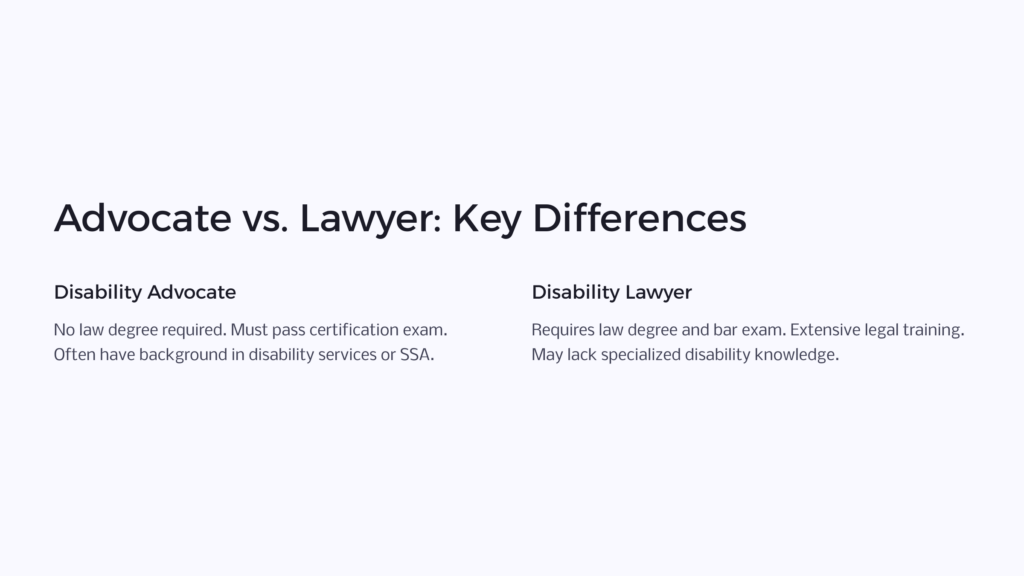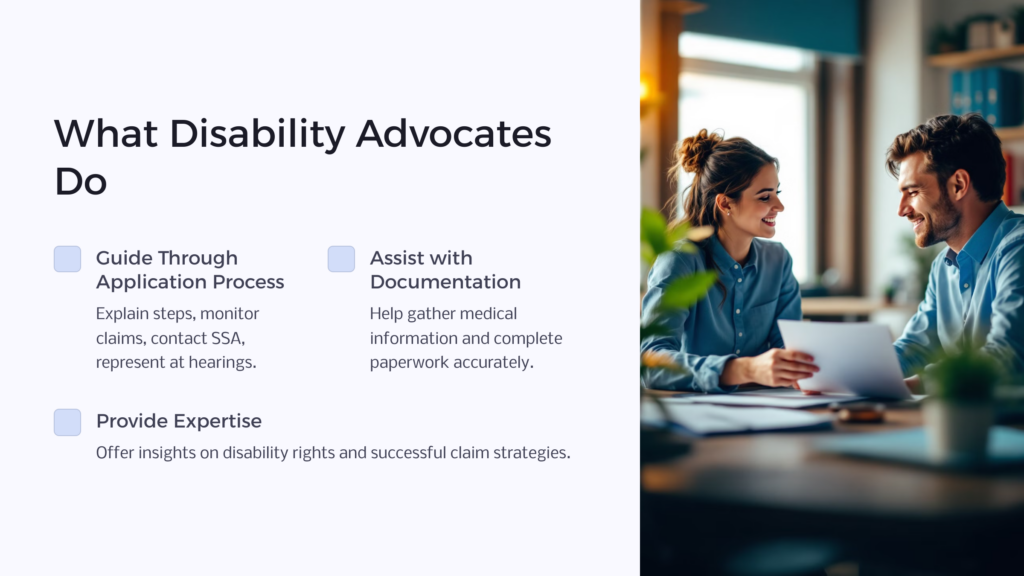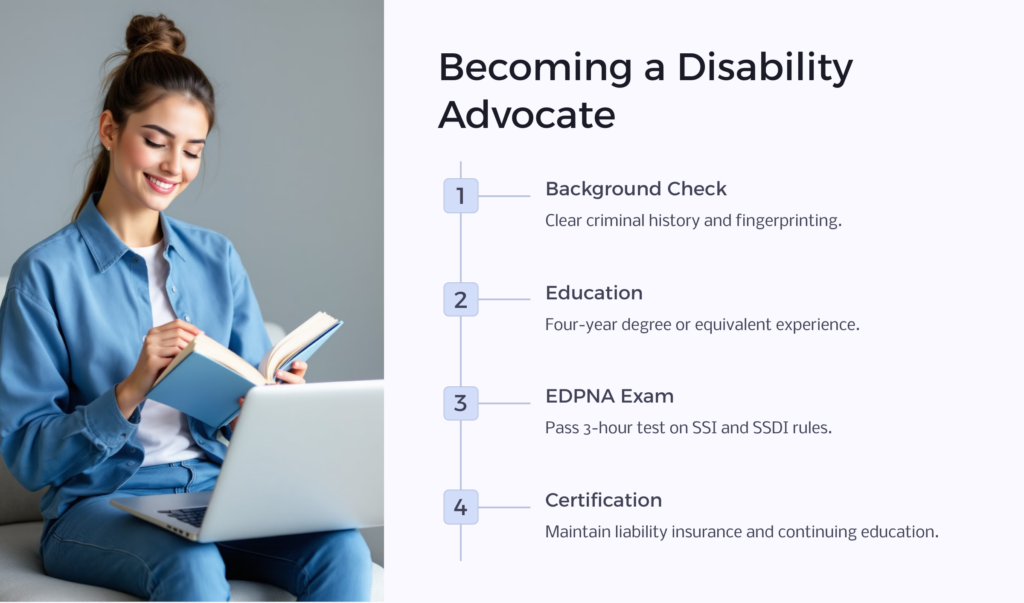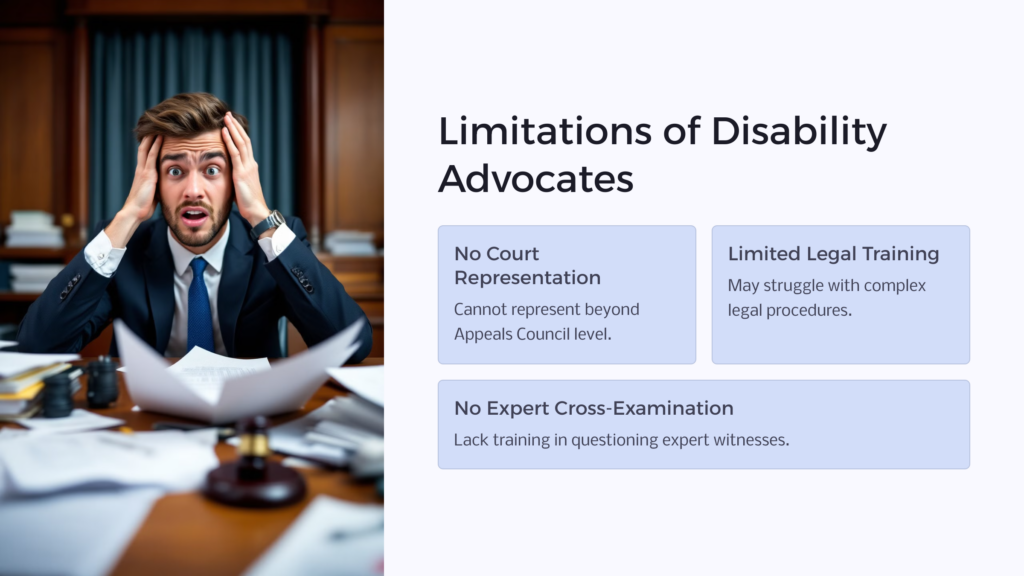A disability advocate is a person who helps you file your claim with the Social Security Administration (SSA) and guides you throughout the appeals process providing legal advice and legal assistance. Most people don’t know the opportunity that comes with disability advocates, and many are unaware this option exists.
As an alternative to hiring a lawyer, a non-attorney disability advocate can be the perfect choice for some disability applicants.
7 Interesting Facts About Disability Advocates
- What’s the Difference Between a Disability Advocate and a Disability Lawyer?
- What Does a Disability Advocate Do?
- Requirements to Become an Advocate
- How Much Does a Disability Advocate Get Paid?
- What Advocates Don’t Do
- How To Interview a Representative
- Where To Find a Disability Advocate
This article focuses on who should consider an advocate vs an attorney and explains the requirements to become an advocate, what advocates don’t do, their fees, and how to find one. If you are considering hiring a non-attorney advocate for technical assistance, this article will help you make a well-informed decision.
What’s the Difference Between a Disability Advocate and a Disability Lawyer?

The Social Security Administration (SSA) has established a certification process for non-attorneys to represent disability applicants with their claims.
The requirements for advocates are not as stringent as attorneys, because advocates don’t need a law degree, legal background, or in some cases, even a college degree.
The main requirement, however, is passing a difficult examination.
Most people who decide to get certified as disability advocates have a background in disability – whether they were once employed by SSA, have personal experience overcoming a disability, or worked for a disability rights organization.
Over the years, the program has expanded to allow agencies and organizations to be advocates. These groups are typically promoting legal rights or civil rights for disabled people.
For these reasons, advocates can be more effective than attorneys. They may take a more personal interest in your claim or may have special knowledge after years of working on “the other side” at SSA or Disability Determination Services (DDS).
The main difference between an advocate and an attorney is educational background and training. Disability attorneys are like all other attorneys: they must graduate college, then law school, and then pass a rigorous bar examination.
Advocates, on the other hand, have fewer educational obstacles, but they still need to jump through several official hoops and have specific knowledge about disability rules.
What Does a Disability Advocate Do?

The work advocates perform for claimants is nearly identical to what a disability attorney provides. They act as guides, advise-givers, helpers, and coaches throughout the disability application process. Advocates can represent a claimant at the later stages of disability application, such as during a hearing in front of an Administrative Law Judge or at the Appeals Council.
Disability advocacy includes:
-
Explaining how the disability application process works, including informing claimants of their disability rights
-
Assisting with the application process, including getting as much medical information upfront as possible
-
Describing the steps the claimant needs to take to be successful
-
Monitoring the disability claim as it goes through the system
-
Contacting the SSA at all stages
-
Acting as a representative at hearings
Requirements to Become an Advocate

The basic requirements to become an advocate include clearing a legal background check, gaining college or equivalent education or training, and passing a Social Security exam.
Criminal background checks are required for professions that deal with vulnerable populations, such as students, prisoners, or the intellectually disabled. The standard procedure involves fingerprinting and checking for criminal history.
Potential advocates must also show they have a high educational level, either a four-year college degree or equivalent training. For example, a person lacking a college education might substitute four years of working as a Disability Examiner for Social Security.
The future advocate must also pass a 3-hour EDPNA (Eligible Direct Payment Non-Attorneys) examination on SSI and SSDI rules and regulations. The application period to take the test extends from February 1 to February 28th each year, and the exam is only offered once a year.
In 2021, the EDPNA will be offered for a full week in June and be supervised remotely.
Most individuals without a background working for SSA directly would have difficulty passing this exam; as a result, many disability advocates once worked within the Social Security system.
Once EDPNA applicants have proven their credentials, passed the criminal check, and passed the exam, they are eligible to become certified. They must fulfill continuing education requirements to keep their status and must possess and maintain appropriate liability insurance as many small businesses do.
The continuing education requirement focuses on knowledge of both Title XIV (Supplemental Security Income) and Title II (Social Security Disability Insurance) regulations and professional ethics.
How Much Does a Disability Advocate Get Paid?
Advocates’ rates are about the same as attorney fees. Usually, there is zero up-front cost, but the fee is deducted when your claim is approved. Typically, this amounts to 25% of the total back pay, also known as the “lump sum” payment, distinct from the monthly disability benefit. The lump sum varies for every claim.
Federal laws make it impossible to charge more than 25% of back pay, with a limit of $6,000 per claim. This means that even if you get $30,000 in back pay, the total charged by an advocate (25%) will never exceed $6,000.
An EDPNA-certified disability advocate is paid directly by SSA, which ensures they will receive proper payment for their work.
What Disability Advocates Don’t Do

Advocates are not attorneys and have no specific legal training or education in disability law. They will not be able to cross-examine an expert witness. Lawyers are trained in techniques to question experts about whether information presented to the court is accurate and trustworthy.
Many SSA Disability Advocates have a background in human services, or civil rights, or have had careers with agencies that work within the disability community. They may work in organizations that promote independent living, assist disabled people with housing or other needs, or fight for disability justice. They may even have legal training, but they are not attorneys.
Advocates can only represent a claimant to the level of the Appeals Council (AC), and they can appeal a denial at initial, reconsideration, ALJ, and AC levels.
Should your disability claim be one of the few that needs a further stage of appeal in a Federal District Court, you would need to drop your advocate and hire a disability attorney.
Why You Should Hire a Disability Advocate
Disability attorneys are far more common than advocates. As a result, they have a larger online presence. Most blogs, websites, and businesses offering help with disability claims are run by law firms.
As a result, the advice is often: “Attorneys are always better than advocates!”
So why would anyone choose a disability advocate over a disability attorney?
The main reason is that advocates often bring inside knowledge of the Social Security system, whether it is experience doing intake of thousands of claims or expertise reviewing thousands of pages of medical records.
Experience often trumps training. Some advocates will have more hands-on experience than attorneys. Most disability claims are decided at the initial, reconsideration, or ALJ level and do not require court representation. At these levels, advocates can offer significant help. Although their fees parallel what an attorney charges, an experienced advocate is arguably a better bet than an inexperienced attorney.
Hiring an advocate can be especially helpful if your claim, or the claim of a family member, involves mental illness or developmental disability, or requires interfacing with mental health services or special education services.
Advocates may be more likely to take your case from the beginning, rather than waiting until you are denied. They have more incentive to do so because they can assist early in the appeals process.
Some claimants choose advocates because they don’t need legal advice, but they do need a coach or cheerleader. For claimants who have mental health impairments, substance abuse issues, or intellectual disabilities, an advocate is well worth the fees. Such individuals also need their civil and legal rights protected.
For these reasons, an advocate may be a better choice.
How To Interview a Representative

It is prudent to research the experience level of the representative you hire.
Interview potential attorneys and advocates before deciding if the person seems knowledgeable, personable, and experienced. Is this someone you want to handle your claim? Do you require face-to-face or telephone contact, or are you happy doing business online?
A few questions to ask any potential representative:
- How many disability cases have you handled?
- How many years have you been working as an advocate (or disability attorney)?
- Please explain your fees
- Do you have experience using assistive technology for communicating?
- How will we communicate about my case (i.e. in your office, by telephone, or online?)
- Why did you decide to become a disability attorney (or advocate)?
- Why should I hire you?
- Have you ever handled a case at the Appeals Council level?
- Have you ever handled a case that went to Federal District Court?
- How long does it usually take to get benefits?
- How many people will be handling my case file?
If you get vague answers, be cautious. An experienced Social Security Disability lawyer or non-attorney disability advocate will be able to talk about specifics and will not automatically refer you to a website.
You should be able to get your representative on the phone. If you have trouble contacting a representative now, that situation may not improve once you’ve applied.
Where To Find a Disability Advocate
Unlike attorneys, advocates can be harder to track down. Some disability advocates work within organizations that pursue disability rights, although many work individually.
Reach out to a Benefits Advocate today for help with your disability claim.
Another way to search is to use the term “EDPNA” in a Google search and add the name of your state. The “EDPNA” is a certification, and you can find non-attorney advocates through a variety of legitimate sites, such as LinkedIn.
A Disability Advocate Can Help With Your SSDI Claim
Should you decide to get help with your Social Security Disability claim, both attorneys and non-attorney advocates are highly knowledgeable? Advocates cost the same, but can usually provide the same level of guidance. They are required to become certified and are paid through SSA. Their only limitation is the inability to argue a claim in federal court and other legal services.
When you apply for disability, it is not possible to know how long the process will take. For some, a benefits check is in the mail within four months – but for others, the appeals process can drag on for years. The more difficult the fight becomes to get benefits, the more valuable it is to have an experienced advocate by your side. If you need to speak with a Disability Advocate, contact our Benefits Team of Advocates today and you will receive a phone call from 844-412-0882.
 Benefits.com Advisors
Benefits.com Advisors
With expertise spanning local, state, and federal benefit programs, our team is dedicated to guiding individuals towards the perfect program tailored to their unique circumstances.
Rise to the top with Peak Benefits!
Join our Peak Benefits Newsletter for the latest news, resources, and offers on all things government benefits.




















